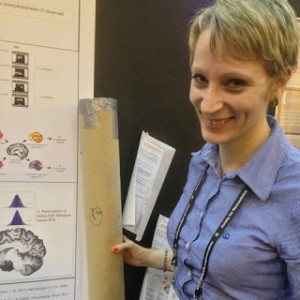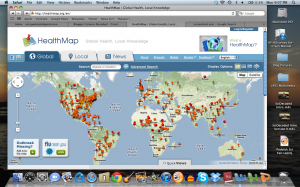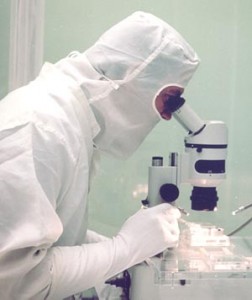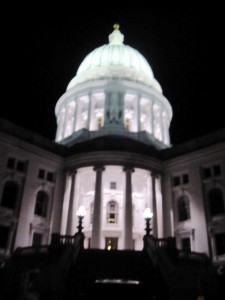You’ve started a blog. Congratulations. Now what?
Of the many things I learned while in Journalism school, perhaps the bit of advice that I echo the most is that if you want to write well, you must read good writing. I’ve found this to be particularly true when blogging. If you want to blog about a topic it is extemely adventageous for you to be aware of what others have already said on the subject. It doesn’t do you or anyone else any good for you to produce content that is already out there (especially if your audience is smaller, and definitely if you don’t cover the topic as well as your peers.)
It has been my experience as a science blogger for three years that what you write doesn’t have to be the most timely, exciting thing on the Internet. Sure, those studies and stories that are making waves are great to write about, and when I blog about things like dinosaurs farting themselves to death I get a decent amount of traffic. But why would anyone care what I think of a study on dinosaurs when they could head over to Laelaps and read what Brian Switek has to say about it? Why would anyone care what I think about an infectous disease story when the world has Maryn McKenna’s Superbug? Or any chemical story when Deborah Blum has that beat superbly locked down?
I don’t think there is much value to writing about things that others have already covered, and covered well, unless there is some angle or something I feel like I can bring to the conversation. For the record, “I agree” doesn’t add much to the conversation – unless a topic is controversial and someone is getting attacked by the trolls and you want to show solidarity. If I do have something to say, in most of those cases it would probably be more beneficial as a blogger (especially a new bloger) to add a comment to those existing posts and jump into the conversation than sounding off in my own diatribe. There are, of course, exceptions when I do think it is worthwhile to toss in your two cents about a topic. But, in general if you aren’t going to blog about the latest splashy story, then what ARE you going to blog about?
What has made the traffic on my blog spike, and has increased my profile as a blogger more than anything else that I’ve done is to write about what interests me the most. Simple, I know, but I think when you are just starting out as a blogger it can be easy to feel like you need to be talking about what everyone else is talking about. The way to get noticed isn’t to join the herd, the way to get noticed is to do something that no one else is doing. Writing about what you feel most passionate about, regardless of everyone else, will make you stand out. Writing about something that matters to you, and gets you fired up, is in my humble opinion the key to writing an exciting post. If you’re excited, it will bleed through your writing.
Offer readers something they can’t get elsewhere – whether that is a manifestation of your childhood obsession with Amelia Earhart, a series of interviews with people you find interesting, or ramblings on your love/hate relationship with learning to code. Find answers to the questions that are bugging you, like when I decided to find out why the Scientific American blog network is so supportive of fledgling science writers. Your blog is your corner of the Internet, so carve it out for yourself. Make yourself at home. You wouldn’t decorate your home in a style that everyone else likes just because they like it, so don’t do it to your blog.
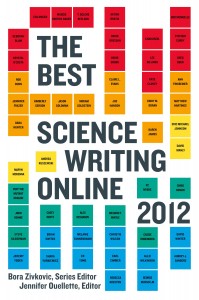 All this isn’t to say that the ideas are just going to start pouring onto the page. Just about every week I spend too much time staring at the empty screen trying to figure out what it is I want to say, and what matters enough to warrant a post, and throwing out all my bad ideas before I hit on something with a spark. Which brings me back to the advice I started with: read good writing. The idea for this post came from reading a collection of blog posts called The Best Science Writing Online 2012 (fomerly known as the Open Laboratory) the brainchild of series editor Bora Zivkovic and 2012 edition guest editor Jennifer Ouellette. The collection gets my sincere recommendation – if you have any interest in being a science blogger, you should check it out. Reading the posts in the collection inspired me, and reminded me how important it is to worry less about what you think everyone wants to read, and more about what you want to say.
All this isn’t to say that the ideas are just going to start pouring onto the page. Just about every week I spend too much time staring at the empty screen trying to figure out what it is I want to say, and what matters enough to warrant a post, and throwing out all my bad ideas before I hit on something with a spark. Which brings me back to the advice I started with: read good writing. The idea for this post came from reading a collection of blog posts called The Best Science Writing Online 2012 (fomerly known as the Open Laboratory) the brainchild of series editor Bora Zivkovic and 2012 edition guest editor Jennifer Ouellette. The collection gets my sincere recommendation – if you have any interest in being a science blogger, you should check it out. Reading the posts in the collection inspired me, and reminded me how important it is to worry less about what you think everyone wants to read, and more about what you want to say.
The sheer diversity of topics, of styles, and of voices in this book is pretty astounding, and drives home the point that writing about what excites you is so important to having a successful blog. Reading all of those posts didn’t make me want to blog about any of the topics, but it did make me want to emulate every one of those writers’ ability to draw on what interests them and write about it in a way that is beautifully their own. Whether than means giving a voice to a fungus fairtale, telling us a tragedy worthy of Romeo and Juliet, or getting pissed off about the way the media ran with a story – all of the writers in The Best Science Writing Online 2012 gave me a piece of themselves in their posts. They are all great writers to be sure, but what makes the posts effective, makes them resonate, is the excitement and interest that they have in their subject whether they are writing about sperm, gin or pirates (really, you should read this collection.)
If you want to write a blog, find the time to read. I get ideas from other writers and other blogs all of the time. It’s never about copying the subject matter, the inspiration comes from putting my own twist on trends and ideas and figuring out what I want to say. I want to talk about what I read, so I write book reviews (even grossly out of date ones) and have started collecting weekly links of my Media Consumption. I want to share my passion for science so I interview researchers for Science For Six Year Olds. When I wanted to talk about grad school, and the job market, I did. When I wanted to write about pengiun sex (and then mention it in a job interview) I did. You don’t have to write about current science news to have ideas that are relevant and worth talking about. Reading other science blogs is the best way I’ve found to figure out what kind of science blogger you want to be and to figure out what fits for you. The Best Science Writing Online 2012 is a great place to start.
If you were to go back in the archives of my blog and see what I wrote about when I first started, it is really nothing like the Science Decoded that I have today. I started out writing a daily post about a science story plucked from the media. I almost never do that anymore. These days I blog more about issues related to being a blogger and a writer than I do about actual topics in science. I think this shift happened because right now I feel more passionate about sharing my experience as a writer than I do about actually doing more science writing (I am priviledged enough that science writing is my day job, afterall.) That’s not to say that I won’t shift back to writing more about scientific research, or to writing about current science news. There is absolutely a need for that type of analysis and for having those conversations online, but I’m not going to force myself to have an opinion about something when there are so many other topics that I actually do have an opinion on. As The Best Science Writing Online 2012 reminded me, your blog should never be a chore. If you always write about what interests you, it won’t be.
